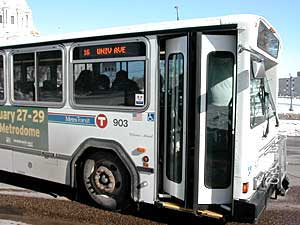|
Audio
Photos
More from MPR
Resources
Your Voice
|
Bus strike creates hurdles for those on welfare
April 5, 2004
 |
| The month-old Metro Transit bus drivers strike has created hardships for people who are trying to get off welfare and need affordable transportation to their jobs. (MPR file photo) |
Minneapolis, Minn. — To get to her cleaning job every day at the Minneapolis-St. Paul International Airport, Jennifer Fields is quickly burning through her meager savings.
"I probably have, like, two weeks. After that I'm probably up to my neck then," Fields says.
 | |||
For the past seven months, Fields paid $1.25 bus fare to ride the 45 minutes from her south Minneapolis apartment to the airport. Since the bus strike began, a friend from church gives her rides occasionally but Fields says he can't keep it up. Mostly, she relies on taxi cabs which charge her up to $22 one way for the same trip.
"I've got to keep going to work until I run out of money again. Then I guess I have to file unemployment," says Fields. "I'm going to have to leave my job. I don't know what I'm going to do."
The situation is a frustrating dilemma for people like Susan Roedl with St. Stephens Human Services in Minneapolis. The agency teaches job skills to people trying to get off public assistance. Half of their clients are homeless. Without the bus, Roedl says the agency's 90 clients turn to the three staff members for help.
|
We sold them this big bill of goods about work -- it's the way, it's going to be better. And now they can't get to work. They might end up homeless, and then they'll be back here again.
- Susan Roedl, St. Stephen's Human Services |
"They're limited very much to where they can walk or where we can drive them. And it's limited by our schedule," says Roedl.
Many of those needing rides are people who have already gone through the St. Stephen's program, and are trying to keep their jobs and stay off welfare. The staff doesn't get extra compensation if they agree to help.
"While the county doesn't hold us responsible for what happens, we feel like we want these people to do well," says Roedl. "We sold them this big bill of goods about work -- it's the way, it's going to be better. And now they can't get to work. They might end up homeless and then they'll be back here again."
St. Stephens job counselor Cynthia Bobo says since the strike began, she has been working an extra hour or two a day, and is still falling behind in all but the most urgent cases.
"These are people that would actually be sitting still if I were not able to take them to appointments. And these are not just regular appointments. These are appointments to get them jobs, to secure that they will have a job, to workshops and things like that," says Bobo.
Those kept on or returning to welfare because of the strike are losing valuable time from their five-year lifetime limit on benefits.
 | |||
Another place pinched by the strike is the Metropolitan Health Plan, a self-supporting HMO run by Hennepin County for people on state assistance. The plan covers transportation to doctor visits, because many of its members don't have cars.
Manager Fausto Iglesias says the agency typically gets about 150 calls a day to arrange rides. That number has jumped to 400 a day since the start of the strike. To handle the increase, Iglesias hired four temporary workers and has some others working extra.
"We anticipated the increase, but not to the extent of 8,000-9,000 calls in a month," says Iglesias. In addition, MHP members without cars must now take cabs to doctors appointments at a much higher cost than buses. A bus ride usually costs less than $2, while cab rides run about $1.60 per mile. Many clients need more than one ride a day.
MHP has to pay the extra cost from a set amount it negotiates with the state. The cost for non-MHP members taking cabs for medical reasons is reimbursed directly from the state. Iglesias doesn't know yet what the extra cost will be, but he says the calls for rides increase daily.
|
News Headlines
|
Related Subjects
|
